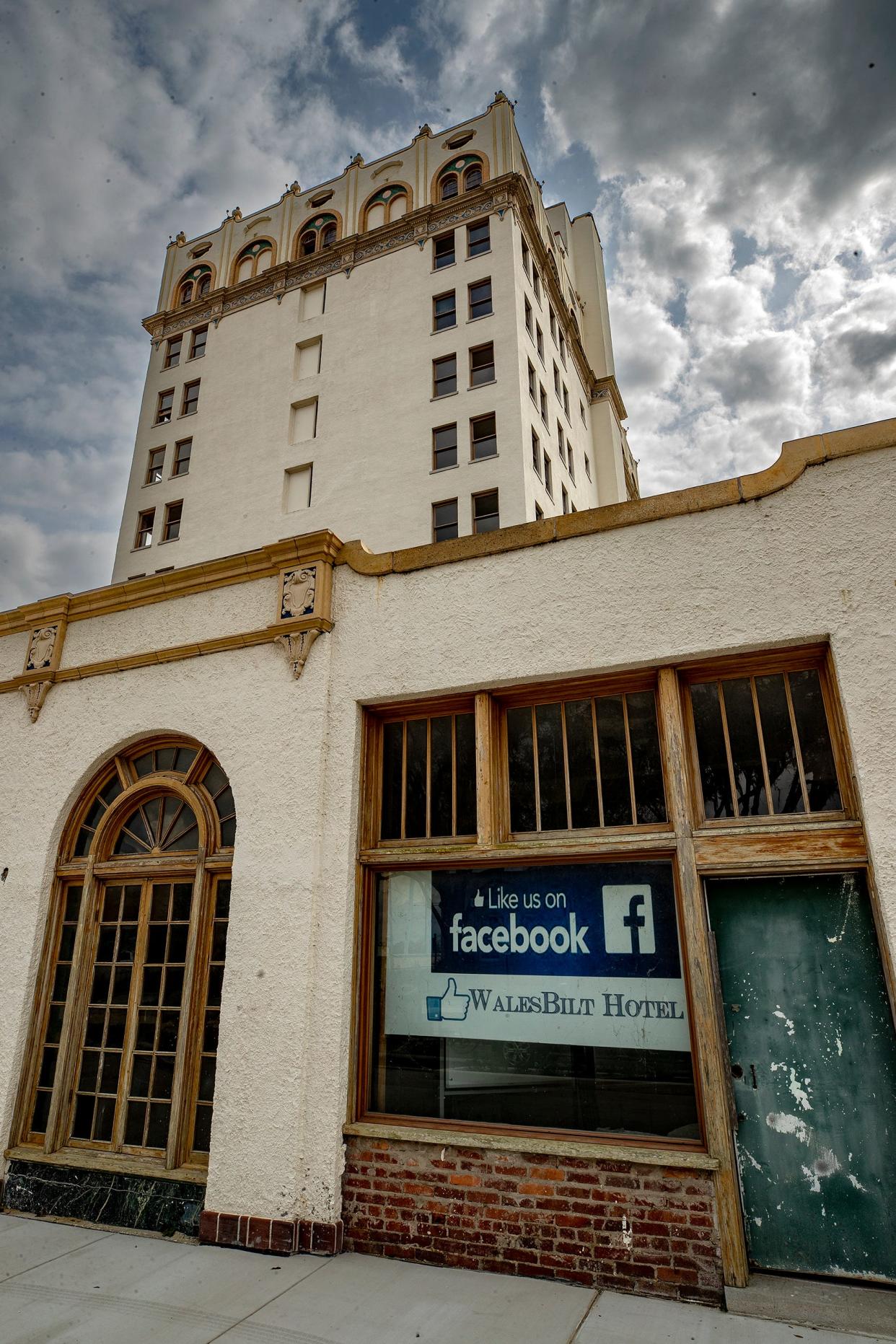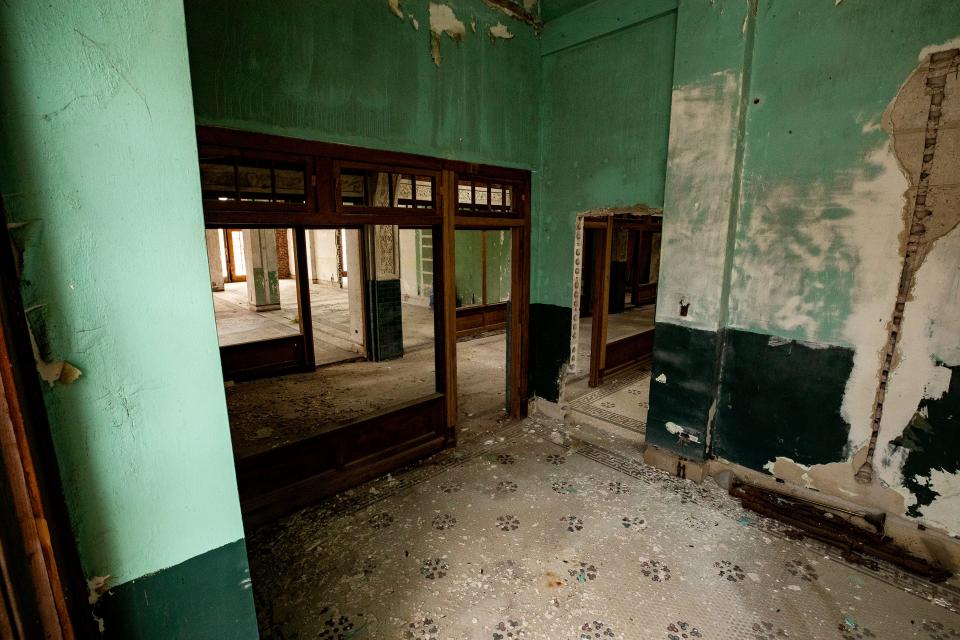Lake Wales gains victory in lawsuit, may regain ownership of historic Walesbilt Hotel

Lake Wales is poised to reclaim ownership of the Walesbilt Hotel, a historic but long-vacant downtown landmark, after a court ruling issued Thursday.
The city sued the property’s owner, Dixie-Walesbilt LLC, in January 2022, alleging that its manager, Raymond E. Brown, made false claims to win a contract in 2010 for renovating the 10-story structure. Brown’s company has made limited progress in restoring the property and has not fulfilled its promise of converting it to private residences.
Circuit Judge William D. Sites issued an order granting a motion for summary judgment filed in June by Lake Wales and its Community Redevelopment Agency. The city requested a partial judgment based on two of 14 counts in its complaint against Dixie Walesbilt LLC, based in Winter Haven.
Those counts alleged that Brown’s company committed fraud in its bid for the Walesbilt renovation contract by making false claims about its financial backing and progress on pre-sales of units.
In the motion, Kevin Ashley, the city’s attorney, focused on Brown’s claim that a supposed associate, Rajesh Kumar, an Indian entrepreneur, was the main financial backer of the project. In depositions from 2014 and 2022, Brown acknowledged that Kumar was never a principal with Dixie-Walesbilt LLC and had not contributed any capital to the company.
Ashley also targeted Brown’s assertion in a second-round submission for the contract that Dixie-Walesbilt LLC had already begun to pre-sell units in the building and was on target to meet its sales goals. The city cited Brown’s testimony in a 2014 lawsuit filed by an architect hired for the project that the company never pre-sold any of the hotel’s 40 planned units.
In his 22-page order, Sites cited testimony from former Lake Wales City Commissioner Terrye Howell that she would not have voted to approve the redevelopment agreement with Brown’s company in 2010 had she known that Kumar had no membership interest with Dixie-Walesbilt LLC and had not contributed money toward the hotel project.
Sites also cited an affidavit from current Lake Wales City Manager James Slaton, who is executive director of the city’s CRA. Slaton said that the city would not have approved the redevelopment agreement had officials known that Brown’s claims about financing were unfounded.
Brent Geohagan, the lawyer representing Dixie-Walesbilt, offered 17 affirmative defenses in response to the city’s motion, including assertions that the allegations of fraud were statements of opinion, that the relevant statute of limitations had expired and that the city had failed to state a claim. In his order, Sites repeatedly wrote that the defense had failed to support its assertions.

Sites’ ruling followed court hearings held in August and November. Sites was recently reassigned to a different division, and Circuit Judge Jennifer Swensen has taken over the Walesbilt case.
Lake Wales Deputy Mayor Robin Gibson, the chair of the city’s Community Redevelopment Agency, said he wanted to review the judge’s order carefully before speaking in detail about it.
“We are grateful for the judge’s order and believe it is eminently correct,” Gibson said.
The Lake Wales City Commission will discuss the judge’s order at Tuesday’s regular meeting, Gibson said.
“We will convey all that we can convey,” Gibson said.
The city’s original complaint sought damages and attorney fees in addition to the revocation of the agreement with Brown’s company.
Geohagan did not respond to a voicemail left Friday morning.
Frostproof mayor becomes seventh candidate in race for Florida House District 48
The Walesbilt Hotel, which opened in 1927 at 5 Park Ave. W., is listed on the National Register of Historic Places. Among its original owners were Florida Gov. John W. Martin and a consortium that included Hollywood actors Mary Pickford, Glorida Swanson and Clara Bow.
The structure, known in the 1980s as the Hotel Grand, was sold at auction in 1995 and closed. It has remained vacant for decades, a sad symbol on the west side of downtown Lake Wales.
The city transferred ownership of the building in 2011 to Brown, who had submitted a redevelopment proposal pledging to renovate the hotel for apartments and retail space. His proposal said he would convert the former hotel rooms into 40 units, with shops planned for the first floor.

Brown has completed some restoration of the building’s interior, as documented by The Ledger. In 2011, Brown told a reporter that he had spent $1.5 million on renovations.
In the city’s complaint, Ashley quoted from a 1997 Florida Supreme Court ruling that referred to a decision from 1980. The initial ruling stated that one who purposely used false information to induce another party into signing a contract should not be able to profit from it.
City-run recreation center: Lake Wales plans to convert decades-old YMCA facility
“DWL should not be allowed to profit from its blatant wrongdoing, obtaining public property under false pretenses,” Ashley wrote in the complaint. “Dishonest conduct should never be rewarded or condoned.”
Sites, addressing the city’s claim of a fraudulent inducement, wrote: “On the Record presented, particularly the sworn testimony of Mr. Brown, the court concludes that only one reasonable conclusion exists: Defendant’s representation that residential units and the Hotel had already been pre-sold was false at the time the Redevelopment Agreement was entered and Defendant knew the statement was false at that time.”
Sites wrote that the court reserved jurisdiction to award attorney fees to Lake Wales.

The city adopted a multiyear revitalization plan in 2021 that includes many downtown projects, such as a redesigned streetscape on Park Avenue, adjacent to the Walesbilt. It is not yet clear how city leaders might seek to pursue another restoration of the hotel if it regains ownership.
Gary White can be reached at gary.white@theledger.com or 863-802-7518. Follow on Twitter @garywhite13.
This article originally appeared on The Ledger: Lake Wales gains victory in lawsuit against owner Walesbilt Hotel

